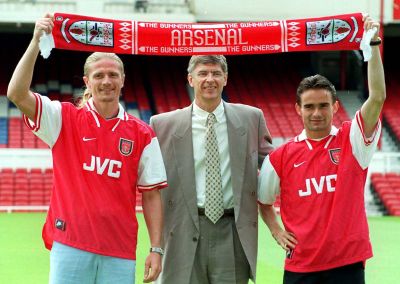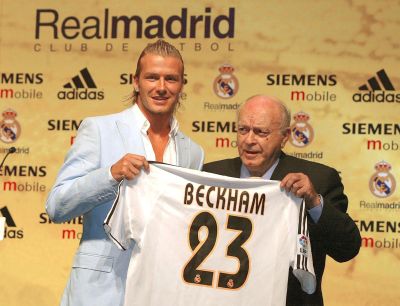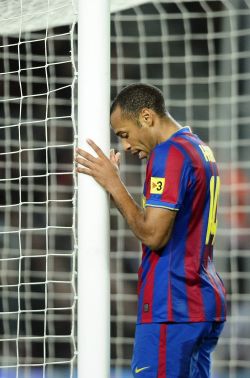Alex Ferguson kept to his word when he defiantly declared he wouldn’t sell “that mob” Real Madrid a virus – he only sold them Cristiano Ronaldo. Of course, many would willingly compare the narcissistic, leg-waxing Portuguese winker to a virus of sorts, but he was, nevertheless, Manchester United’s best player as well as the best in the world at the time.
Behind all his defiant posturing, I’m guessing Ferguson already knew that he wouldn’t be able to stop the Spanish mob from getting their man. Now, Arsene Wenger is having that same sinking feeling over his own best player, Cesc Fabregas.
It’s an all too familiar sensation for the English Premier League’s two most successful managers. The train to Spain has chugged on relentlessly from United to Madrid, and Arsenal to Barcelona, ever since the new millennium.
It all started in the summer of 2000, when Wenger shocked many by selling both Emmanuel Petit and Marc Overmars to Barcelona, akin to Chelsea selling Michael Essien and Florent Malouda today, for a combined fee of £32mil (RM160mil), a massive sum back then.
Petit, the My Little Pony-tailed hardman, was one of Wenger’s best buys. Wenger turned Petit from a little-known defender into a fearsome tackler and accomplished passer in the middle of the park, and many hailed his midfield partnership with Patrick Vieira as the best in the premiership at the time.
But everything went downhill after he left Arsenal. He was often turfed to his old left-back role at Barcelona, which didn’t sit well with him, especially not after his starring roles for both Arsenal and the untouchable World Cup-winning French national team of 1998. A short stint back in the Premier with Chelsea followed, but his career was never the same.
Flying Dutch winger Overmars fared slightly better than Petit, but it was nothing compared to his glory years with Arsenal where he set the Premiership alight and was seen by many as the best left-winger in the world, some even putting him ahead of Ryan Giggs, whose early years as the wonder boy of the Premiership were beginning to take it’s toll on his hamstrings.
One of Giggs’ teammates would be the first of several of Ferguson’s charges to book a one-way ticket to Madrid, a certain David Joseph Beckham, in 2003.
His four seasons in La Liga weren’t the best of his illustrious career, which peaked between 1998 and 2001 when he was the runner-up for the FIFA World Player of the Year title twice.
Beckham was considered overrated in Spain, but he mounted one of his famous “come-becks” with some swashbuckling performances during his final months in Real Madrid, bagging the La Liga title and winning over many of his doubters in the process, including manager Fabio Capello who earlier swore he’d never play Beckham again.
He did have some help from former partner-in-crime Ruud van Nistelrooy, who joined Real Madrid from United in the 2006/07 season. Nistelrooy promptly scored 33 goals with Beckham providing the ammo.

Ruud van Nistelrooy and Beckham continued their fine partnership at United when they joined Real Madrid.
The pair were icons back at United, but Arsenal, however, were about to lose a living legend the following season – Thierry Henry.
It seemed like the end of the world for football fans when the magical Frenchman joined Barcelona’s star-studded attacking lineup of Samuel Eto’o, Ronaldinho and a young Lionel Messi for the 2007/08 season.
Somehow, though, Henry ended the season trophyless, and he complained publicly about life in Spain and not being able to adapt to Barcelona’s style of play.
A Real Madrid side featuring Gabriel Heinze, signed from United over the summer, and van Nistelrooy, bagged the La Liga title that season.
The next season was far more fruitful as former Arsenal teammate Alyaksandr Hleb became the fourth Gunner to join Barcelona since 2000.
Though Hleb had an even more miserable first year – lasting only one season before being shipped off to former club Stuttgart on loan – Henry’s sophomore year was comparatively more sucessful as he chipped in with 26 goals to help Barcelona cruised to their famous Treble in 2008/09. Nevertheless, the former “Invincible” with Arsenal was seen mostly as a squad player in Barcelona.
Then in 2009/10, Madrid got their United man again when Ronaldo joined van Nistelrooy, though his buddy Heinze had already been sold to Marseille after just two poor seasons.
So here we are now before the 2009/2010 season, Fabregas on the verge of joining Barcelona, and Madrid and Jose Mourinho making subtle overtures over Wayne Rooney’s availability.
It seems like Ferguson’s association with the mob is set to become even more complicated, and Wenger’s painstaking rebuilding process set around the cornerstone of Fabregas is about to be torn down by the same customers to whom he sold Petit and Overmars to, supposedly to fund his 2000 rebuilding.
Exactly why this relationship exists between these clubs is a matter of conjecture. Maybe Madrid is the only club that can afford United’s want-away stars. Or, maybe Arsenal, with their silky smooth passing, play a similar style to Barcelona. Who knows?
But as you can see, the one thing we do know is that most Arsenal and United players looking for sunnier times away from England have found that the rain in Spain doesn’t just stay mainly in the plain.
Don’t expect that to stop Fabregas, though. He knows Catalonia well enough.




Tell us what you think!